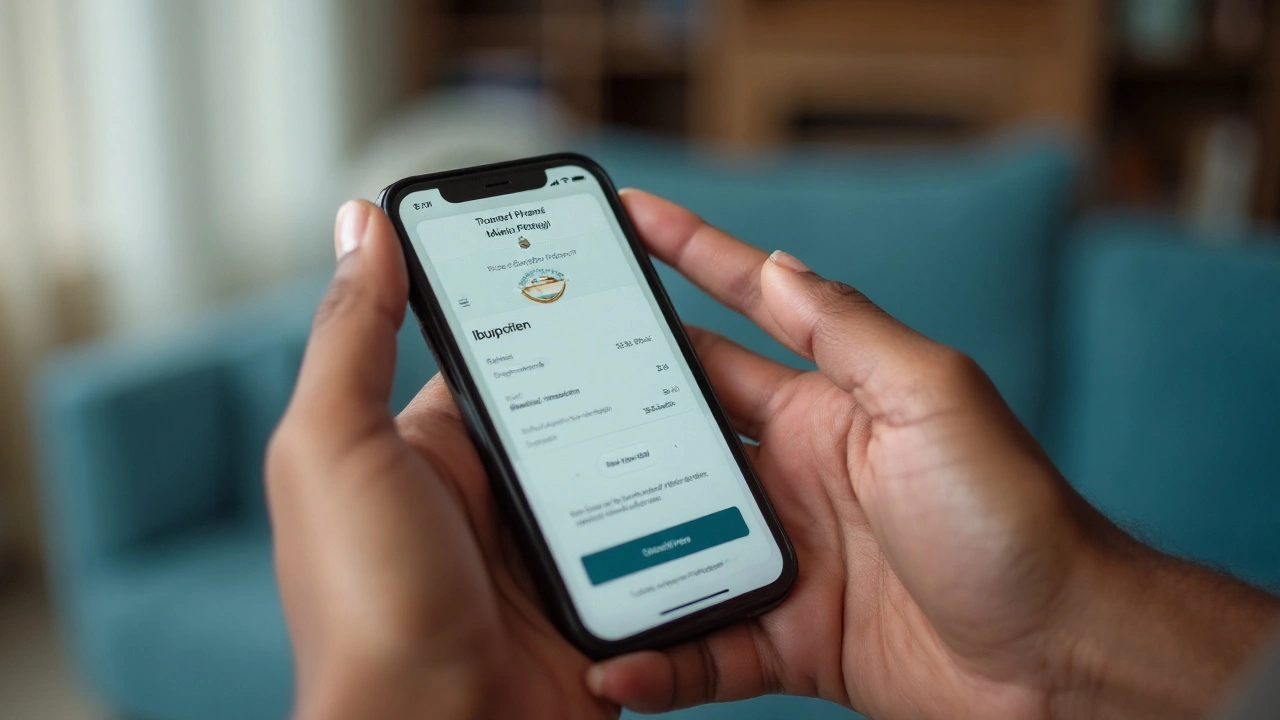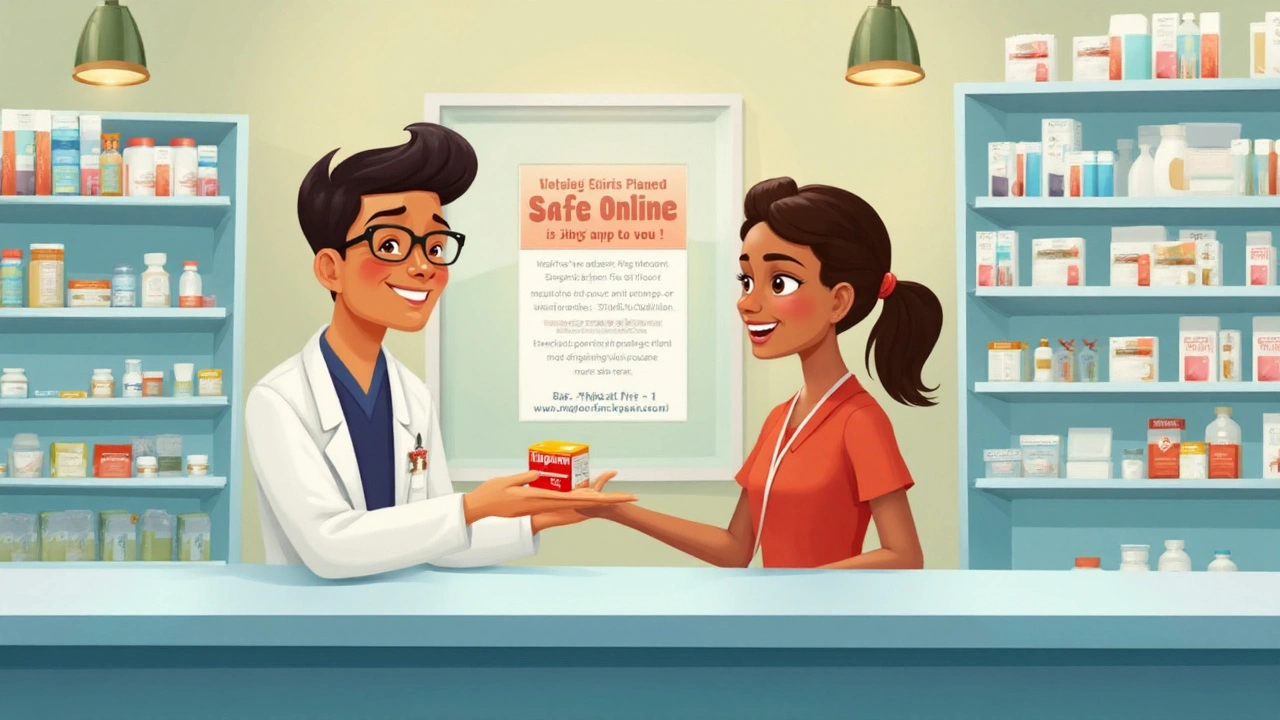Where to Buy Ibuprofen Online: Safe Options, Tips, and What to Know
 Aug, 15 2025
Aug, 15 2025
Ever stuck at home with a throbbing headache, digging through your medicine cabinet, only to find an empty blister pack of Ibuprofen? You’re not alone. Pain doesn’t care if it’s the weekend, if you’re isolating, or if it’s just after midnight. For many in New Zealand, and pretty much anywhere else, the hunt for a fast fix often leads online. But as simple as popping “Ibuprofen online NZ” into Google sounds, things behind the screen get a bit messier. Counterfeit meds, sketchy sites, weirdly shaped pills from overseas—yeah, it’s a lot to chew over before you hit “add to cart.” Turns out, buying Ibuprofen safely online shouldn’t feel like a gamble.
Why Buy Ibuprofen Online?
People are busy. Pharmacies close early and long queues can make anyone cranky, especially if you’re already not feeling great. Online shopping fixes those headaches – literally and figuratively. In New Zealand, the convenience factor is big. You can snag Ibuprofen from your sofa, even in pajama pants, no judgment. A few clicks, a secure checkout, and it’s on its way to your door. Plus, some folks have mobility issues or can’t easily leave the house, so online options are a lifesaver.
No awkward chats at the counter, no rushing before the chemist shuts. Want it in the middle of the night? Online stores don’t sleep. They make it easy to compare prices without wandering down aisles. There’s usually more stock too. Walk-in shops might run out during flu season, but big online retailers usually have backup.
There’s also the privacy angle. Maybe you don’t want your nosy neighbor seeing your purchases at the local shop. With home delivery, no one’s the wiser. And for parents, family-sized packs and combo deals are easier to find online—think mega-packs that keep the whole household stocked for colds, cramps, and headaches.
But let’s get real: safety matters most. While Ibuprofen is a common pain reliever, picking a dodgy seller can land you with fake pills, expired meds, or products that don’t meet New Zealand’s health standards. Stick with trusted websites and big pharmacy chains. Look for clear descriptions, visible expiry dates, and “NZ-registered” tags.
How to Spot Legit Online Pharmacies
Let’s not sugarcoat it. Some online “pharmacies” are just fancy-looking scams. They pop up overnight, slap up a logo, and vanish once they’ve got your details. So, how do you dodge the fakes?
First, check if the site belongs to a known chain—think NZ Pharmacy, Chemist Warehouse, or HealthPost. These shops have reputations to protect, and they stick to New Zealand’s strict medicine rules. Real businesses display their company numbers, NZ physical addresses (even if they ship nationwide), and customer service phone numbers you can actually ring.
Genuine pharmacies follow Medsafe guidance—the body that regulates medicines here. If the site displays a Medsafe badge, that’s a good sign. But don’t just trust logos. Check for a current SSL certificate (that little padlock by the web address) before entering any personal data. No padlock? Abort. It means your info isn’t secure.
It’s smart to hunt for real reviews outside the pharmacy’s own website. Google, Trustpilot, or even local Facebook groups can tell you if others had drama with wrong orders,, mysterious charges, or weeks-long shipping delays. If people complain about fake or oddly packaged Ibuprofen, run, don’t walk.
Customer service is another giveaway. Real shops answer questions quickly. Shoot them an email or ring the provided number before ordering. If you get a generic reply or silence, that’s a red flag.
Payment methods matter too. Steer clear of sites that only want wire transfers, crypto, or preloaded gift cards. Legit pharmacies accept credit/debit cards, POLi, or Laybuy—methods that offer some buyer protection.

Smart Tips for Buying Ibuprofen Online
Ordering Ibuprofen online isn’t rocket science, but a few tricks will save you stress (and money). First thing: check your symptoms. Ibuprofen handles mild to moderate pain, like muscle aches, headaches, period pain, and fevers. Don’t try to self-diagnose more serious stuff—if you’re not sure, call Healthline or talk to a GP online.
Second, figure out the dosage you want. Most over-the-counter Ibuprofen comes in 200mg tablets; higher doses (like 400mg or 600mg) might require a prescription in NZ. Don’t buy anything in a language you don’t understand or that looks suspiciously cheap—these are often aimed at countries with looser medicine laws.
Check for the “Pharmacy Only” or “General Sale” status when you add items to your cart. Sometimes, New Zealand pharmacies will let you buy small packs without a pharmacist reviewing things; bigger packs or prescription strengths need more checks. Answer their health questions honestly—lying about your health to get more pills never ends well.
Be wary of “bulk deals” from overseas. Some sites try to push massive bottles for a bargain price, but they may get stopped at the border by NZ Customs. If you’re ordering for a big family, stick with New Zealand-registered sellers. Local shipments arrive faster and you dodge custom seizures.
Double-check the expiry date promised at checkout. Short-dated stock is sometimes dumped online, so make sure you get at least 12 months’ shelf life left.
Don’t forget shipping times. Ask if they send from within NZ—overseas orders often take weeks and could be turned back by Customs. Some pharmacies offer same-day delivery in Wellington, Auckland, and Christchurch. Might cost a bit extra, but if you need pain relief quickly, it’s a lifesaver.
If you have allergies or are taking other medicines, list them when prompted. Many online pharmacies now use pharmacist chatbots—handy if you’re unsure about mixing Ibuprofen with your asthma inhaler or blood pressure meds.
Legal Stuff: What You Need to Know Before Ordering
New Zealand’s medicine rules keep patients safe, but they do trip up online shoppers sometimes. Ibuprofen in standard doses (200mg tablets, standard bottle size) is classified as a “General Sale” medicine here. You can buy these online without a prescription, just as you would at the local chemist.
If you go above pack limits or strength (like 400mg tablets or bigger bottles), you’re stepping into “Pharmacy Only” or even “Prescription Only” territory. Pharmacies will ask a few basic health questions before selling “Pharmacy Only” painkillers. For “Prescription Only” packs, you'll need a valid script from a NZ-registered doctor.
Importing meds from overseas is where people mess up. Even for something as basic as Ibuprofen, Customs can seize foreign-sourced pills if they look suspicious, are labeled wrong, or go over NZ’s pack limits. That big pharmacy in America or the UK? They might ship out, but your parcel could get stuck at the border. Always check if the site says “NZ-supplied stock”—it’s safer.
Personal data is protected by New Zealand privacy laws. Legit pharmacies must keep your health info secure. Don’t send medical details to websites that don’t show privacy policies or that redirect you all over the place.
Sticking with New Zealand-approved sellers avoids most headaches. Medsafe polices these pharmacies, so you get real Ibuprofen, not weird generics or unproven foreign brands.

Trusted Places to Buy Ibuprofen Online in New Zealand
Ready to actually buy? Here are real, safe options—no shady links, just the truth. If you’re in Wellington or any main center, the big chain pharmacies like Chemist Warehouse, Amcal, Life Pharmacy, and Unichem all run online stores. You’ll find Ibuprofen (in regular and soft gel forms), clear expiry dates, fast shipping options, and NZ-based customer service. HealthPost is another solid online-only shop—they focus on pharmacy and wellness goods and have a no-nonsense returns policy.
Smaller local pharmacies now have webshops too, especially since the big lockdowns. These can be gems for quick, friendly service. Many offer click-and-collect if you’re near the city, letting you skip courier fees and grab your order the same day.
Look for loyalty deals and bundle offers. Some stores run big savings on bulk packs (like three for the price of two), especially around cold and flu season. Join their email lists for flash sales—it’s a smart way to stock up and avoid those emergency dashes.
Remember that you’re still responsible for using Ibuprofen safely. Stick to the dose, read the info leaflet, and talk to a doc if your pain sticks around or you take other meds. And double-check your address at checkout—it’s wild how many painkillers end up at the wrong flat.
One more trick: set a reminder to reorder around the time your home supply gets low. That way, you’re never stuck staring at an empty bottle in the middle of a nasty migraine. Easy win.

Amy Morris
August 16, 2025 AT 14:06Check NZ registration first and skip the drama - buying from Kiwi-registered pharmacies is the simplest, safest move.
Look for a physical address, a real customer service number, and a Medsafe mention before you click checkout. Don’t get lured by ridiculously low prices from overseas sellers because that’s where counterfeit or expired stock usually hides. When in doubt, pick a familiar chain or a local pharmacy webshop that shows expiry dates and batch info.
Also, if you’re on other meds or have conditions, stick to smaller pack sizes sold locally rather than bulk imports that might get seized or worse, interact badly with what you’re already taking.
Becky Jarboe
August 17, 2025 AT 19:00Preferentially use payment rails that give buyer protection and keep receipts for every purchase for audit trails and possible returns.
Sites that only accept wire transfers or crypto are red flags from a compliance perspective and often lack consumer remediation paths. Stick with card payments, POLi or Laybuy for recourse.
Carl Boel
August 18, 2025 AT 23:53Buy local, support local supply chains - importing meds is asking for trouble and undermines domestic standards.
Customs enforcement exists for a reason; foreign pills are a public health risk and often evade proper regulation. If everyone ordered from overseas, the whole system would get clogged and legitimate suppliers would suffer.
Keep it national and safe.
Shuvam Roy
August 20, 2025 AT 07:33Local same-day delivery often saves the day so use it when possible.
Jane Grimm
August 21, 2025 AT 15:13Prioritize provenance and transparency when procuring medications online and be meticulous about the documentation that accompanies any purchase.
It is essential to verify that the supplier is registered and operates within the regulatory framework of the country of sale, thereby ensuring that the product adheres to required safety and quality benchmarks. Scrutinize labels for manufacturer details, batch numbers, and clear expiry dates, and avoid purchases where this information is ambiguous or absent. Maintain a digital and physical record of invoices and correspondence; such documentation may be invaluable for reimbursement, adverse-event reporting, or disputing fraudulent transactions.
Exercise vigilance with cross-border acquisitions because differing pharmacopeial standards and import controls often result in the detention or destruction of consignments. For consumers, reliance upon domestic distribution not only reduces transit time but significantly decreases the probability of encountering counterfeit or substandard formulations. When confronted with unusually low prices, assume a proportionate increase in risk and act accordingly rather than being lulled by apparent bargains.
Maintenance of personal privacy is not negotiable; ensure that any pharmacy you patronize publishes a comprehensive privacy policy and implements HTTPS encryption for checkouts so that health-related disclosures remain confidential and protected against interception. Whenever possible, engage pharmacies that provide a pharmacist consultation channel or documented counseling service, particularly if the purchaser is concurrently taking other medications or suffers from chronic health conditions. Pharmacist oversight is a mitigating factor against harmful drug interactions and inappropriate dosing, especially in vulnerable populations.
Finally, adhere strictly to labeled dosing recommendations and temporal limits for use, and seek professional medical advice for persistent or severe symptoms rather than relying solely on analgesic purchase and use. Responsible self-medication is reliant upon informed choices, documented provenance, and observance of regulatory boundaries.
rajendra kanoujiya
August 22, 2025 AT 22:53Overhyped advice there, people still prefer cheap imports and somehow manage - not everyone needs the pomp around NZ labels.
If it works and arrives fine, that’s the end of the story for many.
Caley Ross
August 24, 2025 AT 06:33Local chains are ideal when you want guarantees, but sometimes smaller independent stores have better stock and faster pickup windows, especially outside peak seasons.
I usually check both: if the chain shows a long delivery time, the local online shop usually offers click-and-collect for same-day pickup and they often pack things more carefully. It’s worth the two extra clicks to check local inventory before committing to a slow courier from across the ditch.
Also keep an eye on loyalty discounts which can make local purchases cheaper than imports once postage and customs risks are factored in.
Bobby Hartono
September 6, 2025 AT 02:53I agree, I’ve burnt myself on slow shipping before and it’s a nightmare when you actually need relief. Buying local avoids the customs gamble and the pharmacist chats you sometimes need because the interactions with other meds are real and not theoretical, especially when people are on blood pressure meds or on blood thinners which makes ibuprofen a sketchy choice without professional input, so I always use vendors that list pharmacist availability and will ship from within the country even if the price is a few bucks higher which is worth it for peace of mind and speed and also because the returns are simpler if something’s wrong and you don’t have to deal with international postage which is often the worst part of trying to return anything.
Charles Markley
September 15, 2025 AT 13:50The naive faith in large chains is absurd; complacency breeds monopolistic slackness and poor customer service in the long term.
One should evaluate suppliers on empirical service metrics and pharmacovigilance transparency rather than brand familiarity alone. Sophisticated consumers will triangulate reviews, regulatory standing, and supply-chain provenance before transacting.